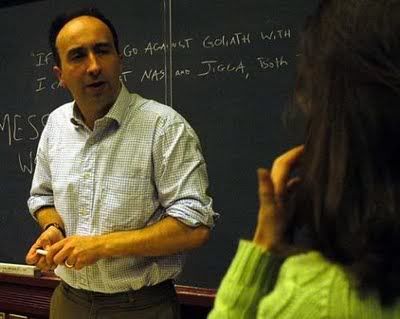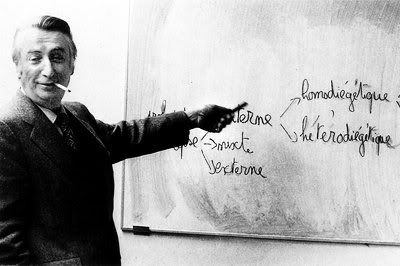: conflicto y convención
en la novela realista contemporánea
Podrá no estarse de acuerdo al cien por ciento con él. Pero más claro que James Wood, fiel a su costumbre, ni el agua. Hoy leía en un ejemplar atrasado del New Yorker este lúcido ensayo sobre la novela realista. No tiene desperdicio. No se vayan con la finta de los émulos región 4 de James Wood. Ahí está el original.
Keeping it real
James Wood
The New Yorker, 2010
Does literature progress, like medicine or engineering? Nabokov seems to have thought so, and pointed out that Tolstoy, unlike Homer, was able to describe childbirth in convincing detail. Yet you could argue the opposite view; after all, no novelist strikes the modern reader as more Homeric than Tolstoy. And Homer does mention Hector’s wife getting a hot bath ready for her husband after a long day of war, and even Achilles, as a baby, spitting up on Phoenix’s shirt. Perhaps it is as absurd to talk about progress in literature as it is to talk about progress in electricity—both are natural resources awaiting different forms of activation. The novel is peculiar in this respect, because while anyone painting today exactly like Courbet, or composing music exactly like Brahms, would be accounted a fraud or a forger, much contemporary fiction borrows the codes and conventions—the basic narrative grammar—of Flaubert or Balzac without essential alteration.
By grammar, I mean the rather lazy stock-in-trade of mainstream realist fiction: the cinematic sweep, followed by the selection of small, telling details (“It was a large room, filled almost entirely by rows of antique computers; there was an odd smell of aftershave and bacon”); the careful mixing of dynamic and habitual detail (“At one of the computers, a man was unhurriedly eating a spring roll; traffic noise pierced the thick, sealed windows; an ambulance yelped by”); the preference for the concrete over the abstract (“She was twenty-nine, but still went home every evening to her mom’s ground-floor apartment in Queens, which doubled by day as a yoga studio”); vivid brevity of character-sketching (“Bob wore a bright-yellow T-shirt that read ‘Got Beer?,’ and had a small mole on his upper lip”); plenty of homely “filler” (“She ordered a beer and a sandwich, sat down at the table, and opened her computer”); more or less orderly access to consciousness and memory (“He lay on the bed and thought with shame of everything that had happened that day”); lucid but allowably lyrical sentences (“From the window, he watched the streetlights flicker on, in amber hesitations”). And this does not even touch on the small change of fictional narrative: how strange it is, when you think about it, that thousands of novels are published every year, in which characters all have different names (whereas, in real life, doesn’t one always have at least three friends named John, and another three named Elizabeth?), or in which characters quizzically “raise an eyebrow,” and angrily “knit their brows,” or just express themselves in quotation marks and single adverbs (“ ‘You know that’s not fair,’ he said, whiningly”). At this level of convention, there is a shorter distance than one would imagine between, say, “Harriet the Spy” and “Disgrace.”
So even if it’s hard to decide whether the novel can really progress it’s easy to see that it can congeal—that certain novelistic conventions grow steadily more conventional, and lose some of their original power. The French literary theorist Roland Barthes called this “the reality effect.” He was talking specifically about fictional detail (the kind that pretends to be quietly “irrelevant,” like Bob’s mole, in one of my hypothetical examples); his larger argument, made elsewhere in his work, was that realistic fiction, like ideology, tries to palm itself off as the most natural and real of literary modes but is in fact the most artificial and unreal. Barthes is ninety-nine per cent right. His rightness is felt every day by any novelist who sits down to a blank piece of paper or a computer screen and tries, despairingly, to think beyond the familiar grammar of narrative. All this silly machinery of plotting and pacing, this corsetry of chapters and paragraphs, this doxology of dialogue and characterization! Who does not want to explode it, do something truly new, and rouse the implication slumbering in the word “novel”? Avant-garde anti-realists probably err in assuming that realist novelists are just complacently or venally recycling convention; my experience is that many intelligent novelists are painfully aware of their bated means, their limitations and timidities and uncertainties, and look with writhing admiration at writers like Beckett or Saramago or Bernhard or David Foster Wallace, who seem to have discovered new fictional languages. All too often, conventional novelists find themselves producing a version of what the art critic Harold Rosenberg called, about fifty years ago, “kitsch”—that is, the following of established rules at a time when artists are calling those rules into question.
But Roland Barthes is one per cent wrong, too; and, like the one per cent that separates us genetically from chimpanzees, Barthes’s tiny wrongness is quite large. Convention may be boring, but it is not untrue simply because it is conventional. People do lie on their beds and think with shame about all that has happened during the day (at least, I do), or order a beer and a sandwich and open their computers; they walk in and out of rooms, they talk to other people (and sometimes, indeed, feel themselves to be talking inside quotation marks); and their lives do possess more or less traditional elements of plotting and pacing, of suspense and revelation and epiphany. Probably there are more coincidences in real life than in fiction. To say “I love you” is to say something at millionth hand, but it is not, then, necessarily to lie. All life is conventional in various ways, like narrative; postmodernists as different as Thomas Pynchon and Steven Millhauser use many conventional narrative elements (sometimes as parody, and sometimes not).
Barthes often sounds as if he considered fictional narrative to be a fundamentally sneaky enterprise, in which bourgeois novelists were conspiring in smooth lies. In this sense, his critique of realism is religious in flavor, and joins a long tradition of religious anti-novelistic suspicion. With less élan than Barthes, but with some of his sacred zeal, David Shields makes a passionate plea for what he calls “reality-based art” in his new book, “Reality Hunger: A Manifesto” (Knopf; $24.95). Shields prosecutes an effective, if coarse, sub-Barthesian argument against the traditional novelistic machinery. He rants a bit, apparently fearful that if he were quieter we would not believe in his sincerity; hungry for his own reality, certainly, he also mentions himself a great deal (a dozen times in the following passage):
I love literature, but not because I love stories per se. I find nearly all the moves the traditional novel makes unbelievably predictable, tired, contrived, and essentially purposeless. I can never remember characters’ names, plot developments, lines of dialogue, details of setting. It’s not clear to me what such narratives are supposedly revealing about the human condition. I’m drawn to literature instead as a form of thinking, consciousness, wisdom-seeking. I like work that’s focused not only page by page but line by line on what the writer really cares about rather than hoping that what the writer cares about will somehow mysteriously creep through the cracks of narrative, which is the way I experience most stories and novels. Collage works are nearly always “about what they’re about”—which may sound a tad tautological—but when I read a book that I really love, I’m excited because I can feel the writer’s excitement that in every paragraph he’s manifestly exploring his subject.
Shields likes short stories more than novels, and essays and memoirs more than fiction. Reality-based art, he says a little mysteriously, “is a metaphor for the fact that this is all there is, there ain’t more.” Like most aesthetic manifestos, his book is an argument for realism; it’s just that he prefers his kind of realism to that of traditional fiction, which strikes him as fake. Certain writers must thus be plucked and praised (Proust, because he is really an essayist; Chekhov, Beckett, Lydia Davis, Joan Didion, Thomas Bernhard, Lorrie Moore, Elizabeth Hardwick), or certain works plucked approvingly from a writer’s oeuvre, because they fit the terms of the manifesto (Nabokov’s “Speak, Memory,” David Foster Wallace’s “A Supposedly Fun Thing I’ll Never Do Again,” the prologue to “Slaughterhouse-Five”—“the best thing Vonnegut ever wrote,” Shields says).
And certain writers must be jettisoned from favor. Since Shields does not like to offend anyone, does not choose to define any of his terms or do any literary criticism, and fills most of his book with contextless quotations from other writers (most of which are not flagged as such in the text), it is hard to divine exactly what or whom he dislikes. When he approvingly cites D. H. Lawrence’s “Studies in Classic American Literature” (because it represents what he nicely calls “the critical intelligence in the imaginative position”), and mentions it in a list of works that include Geoff Dyer’s “Out of Sheer Rage,” Barthes’s “S/Z,” and William James’s “Varieties of Religious Experience,” one assumes that Lawrence’s long novels “The Rainbow” and “Women in Love” have been placed, by silent contrast, in the debit column: too much narrative machinery? But perhaps this is unfair to Shields. (It would certainly be unfair to Lawrence’s relatively unconventional and very “reality-based” novels.) He quotes David Salle, in conversation with Janet Malcolm, who says that he is bored reading George Eliot or Tolstoy, because he is “bored by plot. I’m bored when it’s all written out, when there isn’t any shorthand.” (The two are discussing Thomas Bernhard’s great novel “The Loser,” which Malcolm found initially exciting, and then rather boring, unlike Eliot and Tolstoy.) Perhaps Eliot and Tolstoy have gone into Shields’s outer darkness, but who knows?
His complaints about the tediousness and terminality of current fictional convention are well-taken: it is always a good time to shred formulas. But the other half of his manifesto, his unexamined promotion of what he insists on calling “reality” over fiction, is highly problematic. A moment’s reflection might prompt the thought, for example, that Tolstoy (who so often reproduced reality directly from life) is the great “reality-artist,” and a powerful argument against Shields’s anti-novelistic religious fury. When one first reads Tolstoy, one feels the bindings being loosed, and the joyful realization is that the novel is stronger without the usual nineteenth-century appurtenances—coincidence, eavesdropping, melodramatic reversals, kindly benefactors, cruel wills, and so on. It is hard to imagine a writer more obviously “about what he’s about.” Strangely enough, using Shields’s aesthetic terms and most of his preferred writers (along with some of those he seems not to prefer), a passionate defense of fiction and fiction-making could easily be made. Perhaps he will write that book next.

